Romanticism Gendered
ebook ∣ Male Writers as Readers of Women's Writing in Romantic Correspondence
By Andrea Fischerová

Sign up to save your library
With an OverDrive account, you can save your favorite libraries for at-a-glance information about availability. Find out more about OverDrive accounts.
Find this title in Libby, the library reading app by OverDrive.



Search for a digital library with this title
Title found at these libraries:
| Library Name | Distance |
|---|---|
| Loading... |
This study focuses on the six writing men who have been throughout decades regarded as the alpha and omega of British Romanticism: Byron, Coleridge, Keats, Scott, Shelley, and Wordsworth. It sees these men as a representative cohort of their time and examines their letters as results of a reading process. Although letters are usually seen as additional sources of reference in literary studies, in this book they are treated as the dominant information material: correspondence enables to reconsider British Romanticism on the basis of the epistolary communication of the first half of the nineteenth century.
The target information from the letters are references to women writers and to their writings. A detailed analysis of the correspondence manages to answer the question whether male Romantics regarded writing women as "provoking" from time to time, as Duncan Wu assumes, and whether the gender identity of the woman author influenced the way male readers read her literary works.
The examination of the correspondence thus takes a gendered perspective on British Romanticism. This approach to the target research data discloses a long list of almost 120 names of women writers from different periods and of different literary genres. Whereas the male readers in question have acquired a well-established, stable long-term position within literary history, the women were often marginalized, even forgotten. The study presents plentiful examples proving the discrepancies between what the twenty-first-century reader regards as the core of women's Romantic literary tradition, and what the Romantic reader did.
The following women writers are discussed in the study in detail: Susannah Centlivre, Anne Finch (Lady Winchelsea), Ann Radcliffe, Mary Robinson, Felicia Hemans, Mary Shelley, Joanna Baillie, Maria Edgeworth, Maria Jane Jewsbury, Catherine Grace Godwin, and Emmeline Fisher.







